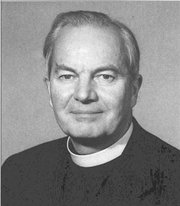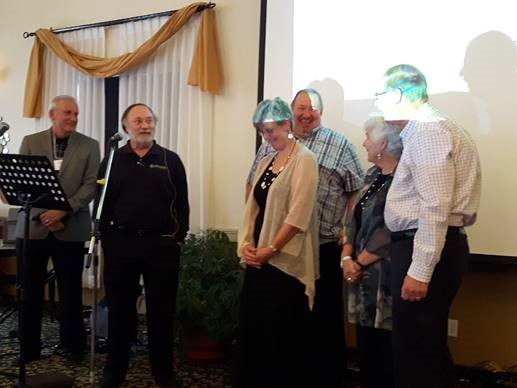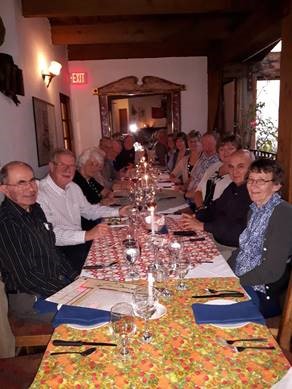Dear Brothers and Sisters,

Are science and theology at odds? Unfortunately many people think so. Thankfully, however, many scientists and theologians have come against this dualistic thinking—one well known to us is theologian Thomas F. Torrance. TF regarded theology as a legitimate science and taught that there is a proper way for what he called scientific theology to fruitfully interact with natural science. According to TF, the only way to know how things exist is to know them in a way that accords with what they truly are. He taught that we must adapt our ways of knowing according to the kind of things we’re attempting to know.
According to TF, this disciplined way of thinking is what true science is all about. You can’t know the moon, for example, with a microscope, or a microbe with a telescope. God has to be known according to his kind of existence—according to his transcendent “nature.” Thus, in accordance with TF’s scientific theology, God is known best and definitively only where he has made himself known to finite creatures, that is, according to his own self-revelation.
Knowledge of God and nature are interconnected

TF taught that science and theology overlap, and while each has a different object of knowledge (creation in contrast to the Creator) they mutually help us become better knowers in their respective fields. Seeing creation as an integrated whole, TF expected the results of theology to illuminate all that we find out about creation through scientific inquiry.
According to TF, because we come to know God and creation as God’s creatures living in his creation, our knowledge of God and creation must, somehow, be interconnected. However, God is not creation and creation is not God. What we call natural science can tell us about God’s creation, but it cannot give us personal, direct and normative (dogmatic) facts about the nature, character, mind, heart and eternal purposes of God. Only God can give us that knowledge, and that is exactly what he has done fully and finally in the person of his incarnate Son, Jesus Christ—a knowledge that has been preserved for us in Holy Scripture.
While the finite cannot know the Infinite by its own powers, the Infinite can make itself (himself!) known to the finite. As Karl Barth said, “God is not imprisoned in his transcendence”—he can and has made himself known to humans in a creaturely form within the limits of our created being (see John 1:14).
TF strongly opposed the dualism of Enlightenment philosopher Emmanuel Kant by teaching a unitary approach that mirrored those of some of the greatest scientists of all history who were openly professing Christians. Kantian dualism, which imposes an absolute separation between God and the world, arose out of an attempt to develop knowledge of God out of the knowledge of natural created things (including the workings of our minds), apart from God’s historical self-disclosure in the person of Jesus Christ. In contrast, TF described theology as “the unique science devoted to knowledge of God, differing from other sciences by the uniqueness of its object, which can be apprehended only on its own terms and from within the actual situation it has created in our existence in making itself known.”
TF saw science as incomplete apart from theology in that science relies on pre-suppositional basics to work—things like the laws of logic, mathematical truth, the fact that the external world exists, the fact that the past is real and not an illusion of human consciousness, and the fact that the world is so structured that science can describe and predict how the physical world works. TF understood that certain fundamental issues related to the true nature of reality can only be addressed by theology—things like the meaning of life, the foundation for recognizing and affirming the existence of good and evil, the forgiveness of sin, and how to know God.
Critical realism
TF taught that though there are both finite and transcendent realities to be known, they are not necessarily automatically or easily known. Knowing them requires critical thinking and methods for detecting error—for we can get it wrong in both science and theology. This “critical realism” does not put into conflict the dynamics of how we know things with the dynamics of the real being of things we seek to know. TF defined theology as being “a dogmatic, or positive and independent, science operating on its own ground and in accordance with the inner law of its own being, developing its distinctive modes of inquiry and its essential forms of thought under the determination of its given subject-matter.” He then noted that the natural sciences have done exactly the same thing in their investigations of nature.
According to TF, God, who is the object of scientific theological inquiry, sovereignly determines whether and how he will be known. He has done just that according to his holy, loving will through the mediation of the knowledge of God in Jesus Christ, the incarnate eternal Son of God. We know God as triune through Jesus Christ by the ministry of the Holy Spirit. The triune God has revealed himself to us as the Father, the Son and the Holy Spirit in his own eternal and undivided Being.
The error of natural theology
The strictly natural theologies make the fatal error of setting up theological norms that override those revealed in the Bible concerning Jesus Christ. They determine these norms by what can be discovered in nature and then abstract the existence of God’s being from God’s external actions in nature (within time and space). In doing so, they limit themselves to concepts about God that can be detected within the material world. But on that basis, nothing can be said about who God is in himself—in his eternal being apart from time and space—about who God is in his nature, essence, eternal character. The result is that Jesus is reduced to what we can know of him as just another man (the error of Arius’ teaching).
According to natural theology, what Jesus tells us of the eternal nature and character of God (e.g. that God is Triune, that God is loving in his eternal being, that God can remake and put right the past, that God is entirely faithful and has no evil in his being at all) cannot be trusted because such claims cannot be verified by studying nature (things limited by time and space). What Jesus does cannot, in this mode of thinking, be identified with who God the Father and the Holy Spirit are. The assumed gap between the created and the Creator controls what we can know and believe, before it is even explored. This is because an unscientific method has been applied to the task of knowing God “from below” before the nature of the object of our knowledge is considered. This approach results in a knowledge of God that, at best, leads to deism. It certainly does not lead to understanding the true nature of God, which has been revealed by God in time and space, and flesh and blood in Jesus, the Son of God who is also the son of man.
The value of scientific theology
Scientific theology understands that God’s being and activity in Jesus are one and the same. As TF explained, “unless the Being and Activity of the Spirit are identical with the Being and Activity of the Father and the Son, we are not saved” (The Christian Doctrine of God, p. 169). According to TF, scientific theology…
…seeks to bring knowledge of God into clear focus, so that the truth of God may shine through unhindered and unobscured by the “opacity” of the human mind…. [It seeks] to allow God’s own eloquent self-evidence to sound through to us in His Logos [Jesus Christ] so that we may know and understand Him out of His own rationality and under the determination of His divine being. (Theological Science)
TF embraced the teaching of Athanasius, Irenaeus, Luther, Calvin and Barth that natural knowledge of God’s creation must not be excluded from nor seen in competition with revealed knowledge of creation that comes to us through the incarnate Word of God and biblical revelation. TF held science in high esteem and viewed “men and women involved in scientific endeavor as being the priests of creation” (The Ground and Grammar of Theology). He taught that as we come to know creation we can illuminate its meaning and purpose as it relates to God and God’s ultimate purposes for all things and not just the functioning of various unrelated bits and pieces. Thus our knowledge about creation, scientifically discovered, can become incorporated into part of our worship, personally and corporately. We can show how creation itself, even in some scientific detail, praises and gives glory to God—like the Psalmists did, with their observations of creation.
Nature, illuminated by the Bible, reveals the work and purposes of the triune God. Therefore, there is a proper “natural theology” that is very much unlike what it is usually understood to be. This additional task within “positive theology” integrates knowledge of creation from the top down, rather than from the bottom up. When seeking to fully understand natural things it is entirely proper to include their relationship to God in the light of scriptural revelation about God and what it says about creation. In order to be truly known, the knowledge of all created things, including the Incarnation or humanity of Jesus, must not be pursued independent of, nor abstracted from, the self-disclosure of our Triune God. Nor should theology be constrained by prior assumptions about how God should be known (if at all) as if God were simply another created thing to be known in the same way as all other created things. TF put it this way:
In theology, this means that natural theology [a theological knowledge of created things] cannot be undertaken apart from actual knowledge of the living God as a prior conceptual system of its own, or be developed as an independent philosophical examination of rational forms phenomenologically abstracted from their material content, all antecedent to positive theology. Rather, must it be undertaken in an integrated unity with positive theology in which it plays an indispensable part in our inquiry and understanding of God. In this fusion [of positive theology about God with theological knowledge of created things] “natural” theology [as normally but incorrectly understood] will suffer a dimensional change and will be made natural to the proper subject-matter of theology. No longer extrinsic but intrinsic to actual knowledge of God, it will function as a sort of “theological geometry” within it, in which we are concerned to articulate the inner material logic of knowledge of God as it is mediated within the organized field of space-time. (Space, Time and Incarnation, p. 70)
In TF’s view, there is plenty of room in theological science for scientific knowledge of nature (creation), that is, for the results of natural science. Theological science can explain the basis for why we can know nature and can incorporate what natural science discovers about it. But the practice of natural science cannot ultimately explain itself or God simply on the basis of its own functioning principles. Theology is the more comprehensive discipline and natural science ought to welcome this and make its findings open to theological interpretation. On the other hand, theology (in accordance with TF’s theological science) can remain open to incorporating the actual findings of natural science concerning nature (though not open to the philosophical speculations of some natural scientists).
Conclusion
God has given us both natural science and theological science so that we can know more about him and his relationship to creation and so creation’s relationship to him and to us. Scientific theology describes how we come to know the truth of Holy Scripture in a way that corresponds to the way we discover the truth of the natural world. I love the picture of the light of God shining upon us and revealing more and more of himself to us, thus building our relationship with him as creatures living in God’s creation.
Appreciating scientific theology,
Joseph Tkach






